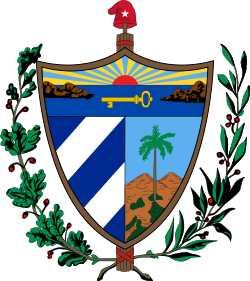2022 Cuban Family Code referendum
 |
|---|
A referendum was held on 25 September 2022 in Cuba to approve amendments to the Family Code of the Cuban Constitution. The revised code contains stronger rules on gender equality and modernizes protections for women, children, the elderly and people with disabilities. Moreover, legal recognition is given to same-sex marriage and adoption and altruistic surrogacy. Following the code's approval, Cuba's family policies have been described as among the most progressive in Latin America.
Background
Until 2019, Article 36 of the 1992 Constitution of Cuba defined marriage as "the voluntary union established between a man and a woman", making same-sex marriage constitutionally impermissible.
In December 2017, LGBT groups began a campaign to repeal the ban as part of the drafting process for the new constitution. On 4 May 2018, Mariela Castro announced proposals for legalizing same-sex marriage as part of the constitutional consultation process. On 21 July, the Council of State announced that the draft constitution would define marriage as a "union between two people". The National Assembly approved the draft on 22 July, and it was subject to public consultation between 13 August and 15 November 2018.
The issue of same-sex marriage triggered public debate and organization in Cuba. In June 2018, five Christian denominations declared same-sex marriage "contrary to the spirit of the communist revolution". In what was described as "a poster war", both opponents and supporters of same-sex marriage put up hundreds of posters around Havana. In September 2018, reacting to conservative opposition, President of the Council of State Miguel Díaz-Canel announced his support for same-sex marriage. In his first interview since taking office in April, he told Telesur that he supports "marriage between people without any restrictions", and is in favor of "eliminating any kind of discrimination in society".
Pressure from religious groups and deep-rooted conservatism in Cuban society resulted in the abandonment of the original definition of "a union between two people". The final draft of the new constitution was ratified by the National Assembly and defined marriage as a "social and legal institution" and "one of the forms of family organization", leaving marriage law a matter for the National Assembly. Mariela Castro said that same-sex marriage would be introduced separately as part of an update to the Family Code. The new constitution was approved in a referendum on 24 February 2019, with 90.6% in favor, and entered into force on 10 April of the same year. Article 82 of the new constitution states:
Preparations

On 15 September 2021, the Cuban government published a draft of the new Family Code, which would legalize same-sex marriage. Article 61 of the draft code states that marriage is "the consensual union between two people" without reference to the sex of the parties. Likewise, parents are no longer defined by their sex; Articles 30 and 31 provide for same-sex adoption and explicitly grant the right of paternity to couples using assisted reproductive technology. The new code was well received by LGBT rights associations, although they remained cautious about the success of the changes. On 30 December 2021, a special commission was created to organize the referendum, headed by the diplomat Antonio Machín.
A public consultation process began on 15 February 2022. Some LGBT groups criticized the decision to call a referendum on the subject. The government responded that it preferred to implement the legislation with express public consent to avoid the perception of imposition by force. Several other countries in Latin America legalized same-sex marriage or civil unions in the same period, leading to protests from Cuba's LGBT community regarding the slow pace of change compared to nearby jurisdictions.
In addition to LGBT issues, the new Family Code also includes greater protection for children and adolescents, the joint responsibility of parents in their education, and strict equality in rights between men and women. The Code also guarantees minors the right not to be the object of exclusion, violence or parental neglect.
On 6 June 2022, version 25 of the Family Code was presented, reflecting the final results of the public consultation and including modifications to 48.73% of the articles.
Opinion polls
Results
The vote commenced for Cuban nationals abroad on 18 September at around 1,000 polling stations worldwide, including at Cuban embassies and consulates, and voting commenced in Cuba itself at 07:00 CDT on 25 September. Polls closed in most of the country at 18:00, though voters in line at polling locations at that time were reportedly allowed to vote. Certain locations in Havana and Santiago de Cuba were allowed to stay open until 20:00 due to rains from the 2022 Atlantic hurricane season. The results were set to be released on 30 September by the National Electoral Council. However, preliminary exit polls showed that a majority of voters supported the proposals. The abstention rate of the referendum was 26%, higher than the abstention rate for the constitutional referendums of 1976 and 2019.